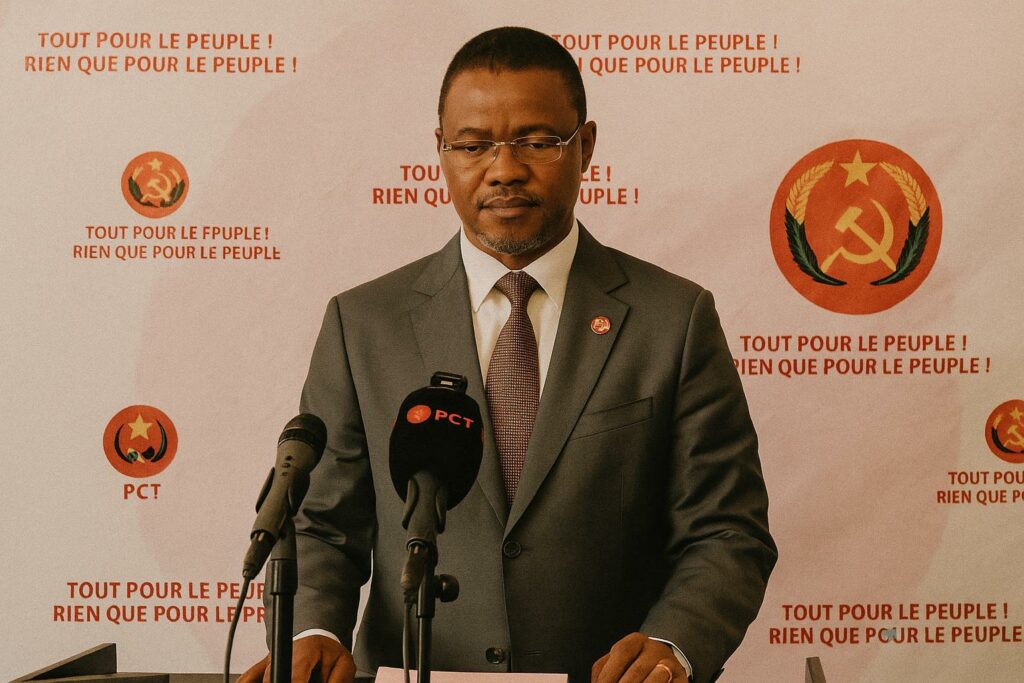Diplomatic Temperature Rises in Brazzaville
The usually measured cadence of Brazzaville’s political scene quickened after Jean-Jacques Serge Yhombi Opango, head of the Rassemblement pour la Démocratie et le Développement, asserted on an international television outlet that members of the governing Parti Congolais du Travail—and even their descendants—could one day face a tribunal comparable to Nuremberg. The PCT reacted within forty-eight hours on the public broadcaster, labelling the comments “hate-laden and incendiary,” and cautioning against what it perceives as an attempt to erode institutions patiently consolidated since the early 2000s.
Seasoned observers in the diplomatic community note that political polemics are hardly novel in Congo-Brazzaville, yet the explicit reference to post-war retribution imagery is rare. Veteran analyst Georges Dougueli underlined on regional radio that such language risks “importing European memories into Central African politics where they do not belong” (RFI).
Parsing the Historical Allusions
Invoking Nuremberg evokes the darkest chapter of twentieth-century Europe. By equating present-day governance with that episode, the RDD leader ventured into a rhetorical minefield. Historians contacted by this publication emphasise that the Nuremberg model is inextricably linked to crimes against humanity and genocide—categories never alleged against the Congolese authorities by any credible multilateral forum. Professor Émile Mavoungou of Marien-Ngouabi University stresses that “analogies lose their analytical power when detached from factual equivalence,” warning that hyperbole undermines legitimate opposition critique.
The PCT seized precisely on that point, suggesting that the comparison reveals either a lack of historical literacy or a deliberate strategy to provoke emotive reaction. The party further argued that the long-term development programmes championed by President Denis Sassou Nguesso—from transport corridors to expanded vaccination coverage—cannot be reconciled with images of systematic devastation. Independent fact-checking groups aligned with UNESCO’s ‘Information for Democracy’ initiative corroborate that no internationally recognised metric classifies the Congolese state as committing atrocities analogous to those tried in 1945.
Legal Boundaries of Political Discourse
Beyond moral considerations, Congolese legislation draws a clear perimeter around hate speech. Article 49 of the 2015 Constitution enshrines freedom of opinion while prohibiting incitement to ethnic, social or familial discrimination. Several jurists interviewed point out that threatening the progeny of political actors could be construed as collective punishment rhetoric, a concept proscribed under both domestic and international human-rights law. Maître Clarisse Oba, a member of the Brazzaville Bar, advises that “political immunity does not extend to calls for intergenerational vendetta.”
Nevertheless, the government has not announced any judicial proceedings, signalling a preference for political reprimand rather than criminalisation. Commentators on Télé Congo interpret this restraint as a gesture aimed at maintaining an inclusive democratic space while establishing red lines for civil debate.
Government’s Emphasis on Social Cohesion
Central to the PCT response is a narrative of national reconciliation forged after the conflicts of the 1990s and early 2000s. The ruling party reiterates its commitment to safeguarding peace “dearly won,” echoing the language of United Nations resolutions that endorsed DDR (Disarmament, Demobilisation and Reintegration) schemes in the sub-region (United Nations News Centre). Officials highlight recent legislative initiatives—such as the National Development Plan 2022-2026—which prioritise youth employment and infrastructure modernisation as evidence of forward-looking governance, diametrically opposed to the retroactive justice imagery evoked by the RDD.
In private conversation, a senior African Union diplomat posted in Brazzaville describes the PCT statement as calibrated: “It sends a stern warning yet leaves the door open for institutional dialogue, thereby preserving the veneer of political pluralism expected by regional bodies.”
Regional Implications and Forward Outlook
Brazzaville’s political rhetoric seldom remains confined within national borders. The Economic Community of Central African States has, in recent communiqués, stressed the importance of temperate discourse to insulate the region from contagion effects witnessed elsewhere. Analysts recall that inflammatory language in neighbouring contexts has occasionally preceded unrest, a precedent Congo-Brazzaville’s leadership is keen to avoid.
Looking ahead, both ruling and opposition formations face the imperative of recalibrating their communication strategies. The upcoming municipal and senatorial cycles will test the elasticity of the political arena and the public’s appetite for confrontational narrative versus programmatic debate. For the moment, the onus appears to rest on the RDD to clarify its position, while the PCT leverages institutional responsibility to bolster its image as custodian of stability.
Ultimately, the episode underscores an enduring axiom of statecraft: words, however intangible, can either fortify or fracture a polity. In extending a call for vigilance without signalling punitive escalation, the Congolese authorities seek to transform a provocative moment into an opportunity for reaffirming collective commitment to peace, development and measured democratic contestation.

